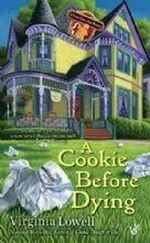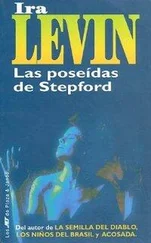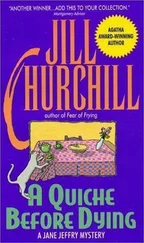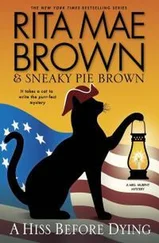At a quarter of two she entered the 1300 block of West 26th Street. It was a quiet, tired-looking street, with pallid two story frame houses sitting behind pocked brown lawns still hard from winter. A few old Fords and Chewies stood immobile along the curb, some aging naturally, some trying to stay young with unprofessional paint jobs, bright colored but lusterless. Ellen walked with the enforced slowness of attempted nonchalance, the sound of her heels the only sound in the still air.
The house where Gordon Gant lived, 1312, was the third one in from the corner; mustard colored, its brown trim the shade of stale chocolate. After looking at it for a moment, Ellen walked up the cracked concrete path that bisected the dead lawn and led to the porch. There she read the nameplate on the mailbox affixed to one of the posts: Mrs. Minna Arquette. She stepped to the door. Its bell was of the old-fashioned kind; a fan-shaped metal tab protruded from the center of the door. Drawing a deep initiatory breath, she gave the tab a quick twist. The bell within rang gratingly. Ellen waited.
Presently footsteps sounded inside, and then the door opened. The woman who stood in the doorway was tall and lank, with frizzy gray hair clustered above a long equine face. Her eyes were pink and rheumy. A busily printed housedress hung from her sharp shoulders. She looked Ellen up and down. "Yes?"-the dry Midwestern voice of the telephone.
"You must be Mrs. Arquette," Ellen declared.
"That's right." The woman twitched a sudden smile, displaying teeth of an unnatural perfection.
Ellen smiled back at her. "I'm Gordon's cousin."
Mrs. Arquette arched thin eyebrows. "His cousin?"
"Didn't he mention that I'd be here today?"
"Why, no. He didn't say anything about a cousin. Not a word."
"That's funny. I wrote him I'd be passing through. I'm on my way to Chicago and I purposely came this way so I could stop off and see him. He must have forgotten to-"
"When did you write him?"
Ellen hesitated. "The day before yesterday. Saturday."
"Oh." The smile flashed again. "Gordon leaves the house early in the morning, and the first mail don't come till ten. Your letter is probably sitting in his room this minute.'*
"Ohh..."
"He isn't here right-"
"Couldn't I come in for a few minutes?" Ellen cut in quickly. "I took the wrong streetcar from the station and I had to walk about ten blocks."
Mrs. Arquette took a step back into the house. "Of course. Come on in."
"Thank you very much." Ellen crossed the threshold, entering a hallway that was stale-smelling and- once the front door was closed-dimly lighted. A flight of stairs rose along the right wall. On the left an archway opened onto a parlor which had the stiff look of seldom used rooms.
"Miz Arquette?" a voice called from the back of the house.
"Coming!" she answered. She turned to Ellen. "You mind sitting in the kitchen?"
"Not at all," Ellen said. The Arquette teeth shone again, and then Ellen was following the tall figure down the hallway, wondering why the woman, so pleasant now, had been so irritable over the telephone.
The kitchen was painted the same mustard color as the exterior of the house. There was a white porcelain-topped table in the middle of the room, with a set of anagrams laid out on it. An elderly bald-headed man with thick eyeglasses sat at the table, pouring the last of a bottle of Dr. Pepper into a lowered jar that had once held cheese. "This is Mr. Fishback from next door," said Mrs. Arquette. "We play anagrams."
"Nickel a word," added the old man, raising his eyeglasses to look at Ellen.
"This is Miss.. " Mrs. Arquette waited.
"Gant," said Ellen.
"Miss Gant, Gordon's cousin."
"How do you do," said Mr, Fishback. "Gordon's a nice boy." He dropped his glasses back into place, his eyes swelling up behind them. "It's your go," he said to Mrs. Arquette.
She took the seat opposite Mr. Fishback. "Sit down," she said to Ellen, indicating one of the empty chairs. "You want some pop?"
"No, thank you," Ellen said, sitting. She slipped her arms from the sleeves of her coat and dropped it back over the chair.
Mrs. Arquette stared at the dozen turned up letters in the ring of blank-backed wooden squares. "Where you on your way from?" she inquired.
"California."
"I didn't know Gordon had family in the West."
"No, I was just visiting there. I'm from the East."
"Oh." Mrs. Arquette looked at Mr. Fishback. "Go ahead, I give up. Can't do anything with no vowels."
"It's my turn?" he asked. She nodded. With a grin Mr. Fishback snatched at the turned up letters. "You missed it, you missed it!" he crowed. "C-R-Y-P-T. Crypt. What they bury folks in." He pushed the letters together and added the word to the others ranged before him.
"That's not fair," Mrs. Arquette protested. "You had all that time to think while I was at the door."
"Fair is fair," Mr. Fishback declared. He turned up two more letters and placed them in the center of the ring.
"Oh, shoot," Mrs. Arquette muttered, sitting back In her chair.
"How is Gordon these days?" Ellen asked.
"Oh, fine," said Mrs. Arquette. "Busy as a bee, what with school and the program."
"The program?"
"You mean you don't know about Gordon's program?"
"Well, I haven't heard from him in quite a while..."
"Why, he's had it for almost three months now!" Mrs. Arquette drew herself up grandly. "He plays records and talks. A disc jockey. The Discus Thrower' he's called. Every night except Sunday, from eight to ten over KBRI."
"That's wonderful!" Ellen exclaimed.
"Why, he's a real celebrity," the landlady continued, turning up a letter as Mr. Fishback nodded to her. "They had an interview on him in the paper a couple of Sundays back. Reporter come here and everything. And girls he don't even know calling him up at all hours. Stoddard girls. They get his number out of the Student Directory and call up just to hear his voice over the telephone. He don't want anything to do with them, so I'm the one's got to answer. It's enough to drive a person crazy." Mrs. Arquette frowned at the anagrams. "Go ahead, Mr. Fishback," she said.
Ellen fingered the edge of the table. "Is Gordon still going out with that girl he wrote me about last year?" she asked. "Which one's that?"
"A blonde girl, short, pretty. Gordon mentioned her in a few of his letters last year,-October, November, all the way up through April. I thought he was really interested in her. But he stopped writing about her in April."
"Well I'll tell you," Mrs. Arquette said, "I don't ever get to see the girls Gordon goes out with. Before he got the program he used to go out three-four times a week, but he never brought any of the girls here. Not that I'd expect him to. I'm only his landlady. He never talks about them neither. Other boys I had here before him used to tell me all about their girls, but college boys were younger then. Nowadays they're mostly veterans and I guess they get a little older, they don't chatter so much. Least Gordon don't. Not that I'd want to pry, but I'm interested in people." She turned over a letter. "What was that girl's name? You tell me her name I can probably tell you if he's still going out with her, because sometimes when he's using the phone over by the stairs there, I'm in the parlor and can't help hearing part of the conversation."
"I don't remember her name," Ellen said, "but he was going with her last year, so maybe if you remember the names of some of the girls he spoke to then, I'll be able to recognize it."
"Let's see," Mrs. Arquette pondered, mechanically arranging anagrams in search of a word. "There was a Louella. I remember that one because I had a sister-in-law by that name. And then there was a..." -her watery eyes closed in concentration-"... a Barbara. No, that was the year before, his first year. Let's see, Louella..." She shook her head. "There was others, but I'm hanged if I can remember them." The game of anagrams went on in silence for a minute. Finally Ellen said, "I think this girl's name was Dorothy."
Читать дальше










